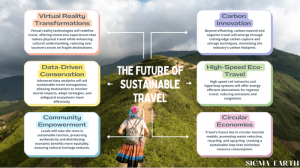
Global impact travel opportunities offer a unique blend of adventure and purpose. Instead of simply sightseeing, these journeys prioritize positive contributions to the communities visited and the environment. From volunteering in local projects to supporting sustainable businesses, impact travel allows travelers to make a tangible difference while experiencing new cultures and landscapes. This exploration delves into the various facets of responsible and impactful travel, providing insights into planning, budgeting, and maximizing the positive impact of your journey.
We will examine various modes of sustainable travel, from eco-friendly accommodations and train journeys to responsible cruise options and road trips that minimize environmental impact. We’ll also discuss the importance of cultural sensitivity and ethical interactions with local communities, ensuring a respectful and enriching experience for all involved. The goal is to empower you to plan and embark on a global impact trip that is both personally fulfilling and beneficial to the world.
Road Trip Guides

Embarking on a road trip offers a unique opportunity to explore the breathtaking landscapes of our national parks while actively contributing to their preservation. This guide provides practical strategies for planning environmentally conscious and community-supporting adventures. By following these guidelines, you can minimize your impact and maximize your positive contribution during your travels.Planning a road trip that balances exploration with environmental responsibility and community support requires careful consideration.
This involves choosing your route, selecting sustainable accommodations, and supporting local businesses throughout your journey. The following sections will delve into the specifics of designing such a trip.
National Park Road Trip Itinerary: A Sample
This sample itinerary focuses on a seven-day journey through a selection of national parks, prioritizing both scenic beauty and environmental awareness. It’s designed to be adaptable to different regions and personal preferences. Remember to check park websites for updated information on permits, fees, and seasonal closures before you begin your trip.Day 1-2: Yosemite National Park (California). Focus on hiking to admire the iconic granite cliffs of El Capitan and Half Dome, while observing Leave No Trace principles.
Accommodation in a nearby eco-friendly lodge or campsite.Day 3-4: Sequoia & Kings Canyon National Parks (California). Explore giant sequoia trees, hike amongst the towering redwoods, and learn about forest fire management techniques. Stay at a park lodge or a nearby cabin committed to sustainable practices.Day 5-6: Death Valley National Park (California/Nevada). Experience the extreme beauty of this desert landscape.
Learn about the delicate ecosystem and the importance of water conservation in arid environments. Choose a hotel or motel with water-saving initiatives.Day 7: Travel day back home, focusing on efficient driving and minimizing fuel consumption.
Minimizing Environmental Impact During Road Trips
Reducing your environmental footprint during a road trip is achievable through conscious planning and responsible actions. Consider these key strategies:
- Fuel Efficiency: Drive at a steady speed, maintain proper tire pressure, and consider using a fuel-efficient vehicle. Proper car maintenance can significantly improve fuel economy.
- Reduce, Reuse, Recycle: Pack reusable water bottles, food containers, and shopping bags. Dispose of waste responsibly and participate in park cleanup initiatives where possible.
- Conserve Water: Minimize shower time and avoid unnecessary water usage at your accommodations. Opt for accommodations with water-saving features.
- Offset Carbon Emissions: Consider investing in carbon offset programs to compensate for the carbon emissions generated during your trip. Many reputable organizations offer this service.
- Respect Wildlife: Maintain a safe distance from animals, avoid feeding them, and stick to designated trails. Observe wildlife without disturbing their natural behavior.
Supporting Local Businesses and Communities
Supporting local economies while traveling enriches the experience and fosters a sense of community. Prioritize these practices:
- Eat Local: Dine at locally-owned restaurants and farmers’ markets, savoring regional specialties and supporting local producers.
- Shop Local: Purchase souvenirs and other goods from local artisans and businesses, contributing directly to the community’s economy.
- Stay Local: Choose locally-owned accommodations, such as bed and breakfasts, family-run hotels, or eco-lodges, rather than large chain hotels.
- Hire Local Guides: If you’re engaging in activities such as hiking or wildlife viewing, consider hiring local guides to support their livelihoods and gain valuable insights from their expertise.
- Volunteer: Consider volunteering your time with local environmental organizations or community projects to contribute directly to the well-being of the region.
Budget Accommodation Tips
Traveling on a budget doesn’t mean sacrificing comfort or unique experiences. Smart choices in accommodation can significantly impact your overall travel costs, allowing you to stretch your funds further and explore more. This section explores various budget-friendly options and provides practical tips for finding affordable and sustainable places to stay.Finding affordable accommodation is crucial for budget travelers. Several options exist, each with its own advantages and disadvantages, catering to different travel styles and preferences.
Careful planning and research can unlock significant savings.
Types of Budget-Friendly Accommodation, Global impact travel opportunities
Budget travelers have a range of options beyond traditional hotels. Hostels offer dorm-style rooms or private rooms at significantly lower prices than hotels. They often foster a social atmosphere, providing opportunities to meet fellow travelers. Guesthouses, often family-run, offer a more personal and intimate experience, sometimes including breakfast. Airbnb and similar platforms offer a wide variety of options, from private rooms in local homes to entire apartments, providing greater flexibility and often a more local experience than hotels.
Budget motels, while less common in some regions, remain a viable option in certain areas, particularly along road trip routes. Finally, camping and homestays provide even more affordable choices for the adventurous traveler.
Finding Affordable and Sustainable Accommodation
Finding affordable and sustainable accommodation requires a multi-pronged approach. Booking in advance, especially during peak season, can often secure better rates. Consider traveling during the shoulder seasons (spring and autumn) when prices are generally lower. Flexibility with your travel dates can also yield significant savings. Websites and apps often highlight eco-friendly accommodations, which may use renewable energy, reduce water consumption, and support local communities.
Reading reviews carefully can help identify accommodations with a strong commitment to sustainability and a positive impact on the local environment. Looking for accommodations outside of major city centers can also lead to lower prices and a more authentic cultural experience.
Websites and Apps for Booking Budget-Friendly Accommodations
Several websites and apps specialize in helping travelers find affordable accommodation. Hostelworld, as its name suggests, is a great resource for finding hostels worldwide. Booking.com and Expedia offer a broader range of options, including budget hotels, guesthouses, and Airbnb listings, allowing for comparison shopping. Airbnb itself is a powerful tool for finding unique and often more affordable accommodations, particularly for longer stays.
Google Hotels provides a convenient search engine aggregating various platforms, allowing for quick comparison of prices and availability. Finally, specialized apps like Skyscanner and Momondo can also help you find budget-friendly flights and accommodations as part of a package deal.
Vacation Rentals and Airbnb: Global Impact Travel Opportunities
Vacation rentals, particularly through platforms like Airbnb, offer a compelling alternative to traditional hotels for global impact travelers. They often provide a more immersive cultural experience and can contribute directly to local economies, but careful consideration of their environmental and social impact is crucial. This section explores the advantages and disadvantages of utilizing vacation rentals for globally conscious travel, along with strategies for selecting accommodations that promote sustainable tourism and support local communities.Vacation rentals present several advantages for the globally minded traveler.
They frequently offer more space and amenities than hotel rooms, allowing for a more comfortable and independent stay. Furthermore, they often provide a more authentic experience, as they are frequently located within residential areas, offering greater interaction with local residents and a deeper understanding of the community’s daily life. Conversely, the lack of standardized services and potential for inconsistent quality represent significant drawbacks.
Issues with cleanliness, maintenance, and communication with hosts can detract from the overall experience. The environmental impact of numerous smaller properties, rather than larger, more efficiently managed hotels, can also be a concern.
Pros and Cons of Using Vacation Rentals for Global Impact Travel
Utilizing vacation rentals for global impact travel presents a blend of advantages and disadvantages. On the positive side, they often provide opportunities for more authentic cultural immersion and direct economic support for local communities. However, concerns regarding consistency of quality, potential environmental impact, and the absence of standardized services must be considered. A balanced approach, carefully selecting accommodations and mindful of responsible travel practices, is essential.
Finding Sustainable Vacation Rentals
Finding vacation rentals that align with sustainable tourism principles requires proactive research and careful selection. Look for accommodations that highlight eco-friendly practices, such as renewable energy usage, water conservation measures, and waste reduction initiatives. Consider properties that utilize locally sourced materials in their construction and décor, and prioritize those that promote local businesses and employment opportunities. Websites and platforms that specifically focus on sustainable tourism can be invaluable resources in this search.
For example, a search for accommodations with certifications such as LEED (Leadership in Energy and Environmental Design) or Green Globe can help identify environmentally conscious choices. Reading reviews from previous guests can also provide insights into the property’s commitment to sustainability and community engagement.
Examples of Vacation Rentals Supporting Local Communities
Many vacation rentals actively support local communities. For example, some properties partner with local artisans to furnish their accommodations, showcasing and selling unique handcrafted items. Others may collaborate with local businesses, recommending and supporting them through partnerships or preferential treatment. A farm stay in rural Italy, for instance, might offer guests the chance to participate in harvesting local produce or learn traditional cooking techniques from the owners.
Similarly, a guesthouse in a developing country might source its food and supplies from local producers, ensuring that the economic benefits of tourism are directly felt within the community. These examples illustrate how vacation rentals can become powerful tools for promoting sustainable and impactful travel.
Hotel Reviews and Tips

Choosing sustainable accommodation is becoming increasingly important for environmentally conscious travelers. This section delves into the world of eco-friendly hotels, offering guidance on comparing their sustainability initiatives and providing detailed reviews of exemplary establishments across various regions. We’ll explore what makes a hotel truly eco-conscious and how you can identify and support these businesses during your travels.Finding hotels committed to sustainability requires careful consideration beyond just marketing claims.
Many hotels advertise “green” features, but their actual practices may vary widely. A thorough review process, including examining certifications and verifying claims, is essential to making an informed choice. This section aims to provide you with the tools and information needed to make such decisions.
Comparing Hotel Sustainability Initiatives
A critical aspect of choosing a sustainable hotel involves comparing their environmental initiatives. This goes beyond simply looking for solar panels or recycling bins. Consider the hotel’s water conservation strategies, energy efficiency measures, waste management programs, and sourcing of food and amenities. Look for hotels with third-party certifications, such as LEED (Leadership in Energy and Environmental Design) or Green Globe, which validate their commitment to sustainability.
These certifications provide a level of assurance that the hotel’s claims are backed by rigorous standards. Compare the specific initiatives of different hotels to find the best fit for your values. For instance, one hotel might excel in water conservation while another prioritizes renewable energy.
Eco-Friendly Hotel Reviews: Regional Examples
Several hotels worldwide are leading the way in sustainable tourism. For example, the Costa Verde Lodge in Manuel Antonio, Costa Rica, boasts stunning rainforest views and actively participates in rainforest conservation efforts. Their commitment extends to using locally sourced food, employing sustainable building practices, and minimizing their environmental footprint. In contrast, the Fairmont Le Château Frontenac in Quebec City, Canada, showcases a commitment to reducing carbon emissions through energy-efficient operations and responsible waste management.
Their commitment extends to community engagement and supporting local initiatives. These examples highlight the diverse approaches hotels take towards sustainability, catering to various preferences and locations.
Key Features of Eco-Friendly Hotels
The following table summarizes key features to consider when selecting an eco-friendly hotel. These features highlight the diverse aspects of sustainability that a hotel might prioritize.
| Feature | Description | Example | Impact |
|---|---|---|---|
| Water Conservation | Strategies to reduce water usage, such as low-flow fixtures and water recycling systems. | Installing low-flow showerheads and toilets. | Reduces water consumption and strain on local water resources. |
| Energy Efficiency | Measures to minimize energy consumption, including renewable energy sources and energy-efficient appliances. | Utilizing solar panels and LED lighting. | Reduces carbon emissions and reliance on fossil fuels. |
| Waste Management | Programs to reduce, reuse, and recycle waste, including composting and waste reduction initiatives. | Implementing comprehensive recycling programs and composting food waste. | Minimizes landfill waste and promotes resource conservation. |
| Sustainable Sourcing | Prioritizing locally sourced food, amenities, and materials to reduce transportation emissions and support local economies. | Using locally grown produce in the restaurant and sourcing building materials from nearby suppliers. | Reduces carbon footprint and supports local communities. |
RV and Camper Travel
RV and camper travel offers a unique opportunity to experience destinations in a sustainable and responsible manner. Unlike traditional modes of tourism, RV travel allows for greater flexibility, reduces reliance on commercial accommodations, and minimizes carbon emissions when compared to frequent flights or multiple car rentals. This method encourages a slower pace of travel, fostering deeper connections with the environment and local communities.RV and camper travel, when approached thoughtfully, can significantly reduce the environmental impact of tourism.
The ability to self-cater reduces reliance on restaurants and single-use plastics, while the freedom to choose remote, less-visited locations minimizes pressure on popular tourist hotspots. Careful planning and conscious choices further enhance the sustainability of this travel style.
Minimizing Environmental Impact During RV and Camper Trips
Planning a low-impact RV or camper trip requires careful consideration of several factors. Prioritizing fuel efficiency through proper vehicle maintenance and mindful driving habits is crucial. Choosing campsites that prioritize conservation and minimizing waste generation is equally important. Selecting campsites with recycling facilities and composting options, and actively utilizing them, helps to reduce the environmental footprint.
Examples of RV-Friendly Destinations Supporting Local Communities
Many destinations actively encourage responsible RV tourism and benefit economically from it. National and state parks often offer designated RV campsites, generating revenue that is directly reinvested in park maintenance and conservation efforts. Smaller towns and rural communities also benefit significantly from RV travelers who patronize local businesses, restaurants, and shops, boosting the local economy. For example, the small town of Moab, Utah, thrives on tourism generated by visitors exploring nearby national parks in their RVs, supporting local businesses with their spending.
Similarly, many coastal towns in Oregon and California rely heavily on the economic activity brought by RV travelers visiting their scenic areas.
Unique Stays and Treehouses
Stepping beyond the typical hotel experience opens a world of adventure and unique accommodation options. These alternatives offer not only a memorable stay but often contribute positively to sustainable tourism and support local communities. From rustic charm to luxurious escapes, the possibilities are vast and cater to a range of travel styles and budgets.Exploring unique accommodation choices allows for deeper immersion in a destination’s culture and environment.
It presents opportunities to connect with local communities, experience sustainable practices firsthand, and minimize your environmental impact. By choosing these options, you are directly supporting smaller businesses and contributing to the preservation of unique landscapes and traditions.
Types of Unique Accommodations
Unique stays encompass a wide range of options beyond the traditional hotel room. These choices offer diverse experiences and cater to various preferences. Examples include treehouses offering a secluded escape amongst the canopy, yurts providing a nomadic feel, and eco-lodges blending seamlessly with their natural surroundings. Other options might include converted barns, historic castles, or even cave dwellings offering truly unique and memorable experiences.
Consider the location, amenities, and overall atmosphere when choosing the best fit for your travel style.
Sustainable and Community-Supporting Stays
Many unique accommodations actively prioritize sustainability and community engagement. For example, some eco-lodges utilize renewable energy sources, implement water conservation practices, and source local materials for construction and furnishings. Others actively partner with local communities, employing local staff, sourcing food from nearby farms, and supporting local artisans. A stay in a community-based tourism project, for example, can directly benefit local families and contribute to the preservation of cultural heritage.
Look for accommodations that highlight their commitment to sustainability through certifications or clear descriptions of their practices.
Finding and Booking Eco-Friendly Accommodations
Several online platforms specialize in showcasing unique and eco-friendly accommodations. Websites dedicated to sustainable tourism often feature listings with detailed information on their environmental and social impact. Filtering your search by criteria such as “eco-friendly,” “sustainable,” or “community-based” can help you narrow down your options. When booking, look for details about the accommodation’s commitment to sustainability, such as certifications from organizations like Green Globe or LEED.
Reading reviews from previous guests can also provide valuable insights into the accommodation’s environmental practices and community engagement. Remember to confirm the accommodation’s commitment to sustainability before booking, and consider contacting them directly with any questions.
Houseboat and Yacht Stays
Houseboats and yachts offer a unique and luxurious travel experience, allowing exploration of waterways and coastal regions in a way land-based travel cannot match. However, this type of tourism also carries significant environmental implications that need careful consideration. Responsible choices are crucial to minimize the negative impacts and maximize the positive contributions of this growing sector.The environmental impact of houseboat and yacht stays is multifaceted.
Wastewater discharge, fuel consumption, and potential damage to sensitive marine ecosystems are key concerns. Noise pollution can also disrupt marine wildlife, and anchoring can damage seagrass beds and coral reefs. The increased demand for these types of accommodations also puts pressure on already strained resources in popular destinations.
Environmental Impact of Houseboat and Yacht Stays
Houseboats and yachts, particularly larger vessels, consume substantial amounts of fuel, contributing to greenhouse gas emissions and air pollution. Wastewater discharge, if not properly treated, can contaminate water bodies, harming marine life and potentially affecting human health. Improper disposal of garbage and other waste materials further pollutes the environment. Furthermore, the physical presence of numerous vessels can lead to habitat destruction and disruption of natural ecosystems.
For example, careless anchoring can damage delicate seagrass beds, which are vital nurseries for many fish species. The noise generated by engines and onboard activities can also disturb marine animals, impacting their communication and feeding patterns. Finally, the increased demand for these types of accommodations can lead to over-tourism in certain areas, placing a strain on local infrastructure and resources.
Choosing Eco-Friendly Houseboat and Yacht Options
When choosing a houseboat or yacht, prioritize operators committed to sustainability. Look for vessels with advanced wastewater treatment systems, efficient engines that minimize fuel consumption, and responsible waste management practices. Consider the size of the vessel; smaller boats generally have a lower environmental impact. Choose operators that actively participate in conservation efforts, such as reef cleanup initiatives or educational programs about marine conservation.
Inquire about their fuel efficiency and waste disposal methods. Opt for operators who emphasize responsible anchoring practices, avoiding sensitive areas like seagrass beds and coral reefs. Look for certifications or awards that recognize environmentally friendly practices. Supporting operators who prioritize sustainability sends a strong message to the industry, encouraging more responsible tourism practices.
Examples of Responsible Houseboat and Yacht Tour Operators
While specific examples require ongoing research due to the constantly evolving nature of the industry and certifications, a responsible approach to finding such operators involves actively researching their environmental policies and practices. Look for companies that openly share their sustainability initiatives on their websites, highlighting their commitment to minimizing their environmental footprint. Seek out reviews and testimonials from previous clients mentioning positive environmental practices.
Consider contacting the operators directly to inquire about their environmental policies and certifications. By doing your due diligence, you can contribute to supporting companies that are actively working towards more sustainable tourism practices in the houseboat and yacht industry.
Ultimately, embracing global impact travel is about more than just ticking off destinations on a bucket list; it’s about fostering meaningful connections, contributing to positive change, and creating lasting memories that extend far beyond the journey itself. By making conscious choices about how we travel, we can minimize our environmental footprint, support local economies, and contribute to a more sustainable and equitable future for all.
The information provided here serves as a starting point for your own exploration of responsible and impactful travel, empowering you to plan a trip that leaves a positive mark on the world.
FAQ Compilation
What is the difference between impact travel and volunteering abroad?
While both involve contributing to a community, impact travel often encompasses a broader range of activities beyond formal volunteering, including supporting local businesses and engaging in culturally sensitive interactions.
How can I find reputable global impact travel organizations?
Research organizations thoroughly, checking for transparency in their operations, positive reviews from past participants, and alignment with your values. Look for certifications or affiliations with reputable sustainable tourism organizations.
Is impact travel more expensive than traditional tourism?
It can be, depending on the type of activities and accommodation chosen. However, careful planning and budgeting can make it accessible, even on a limited budget.
What if I don’t have specific skills to offer as a volunteer?
Many global impact travel opportunities welcome volunteers with a variety of skills and backgrounds. Even basic tasks such as teaching English or assisting with community projects can make a difference.






